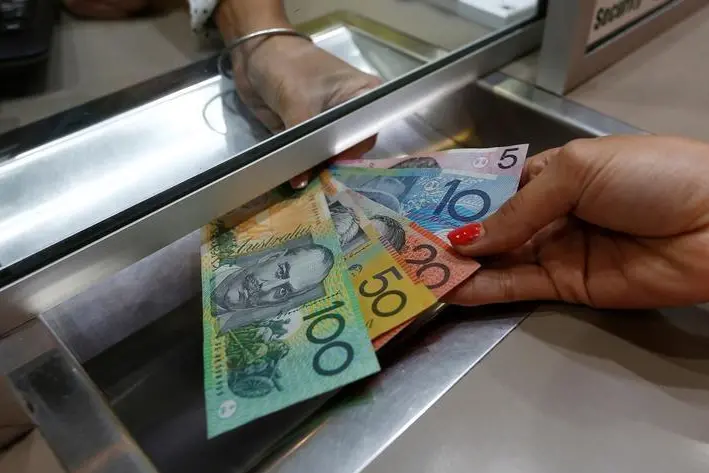PHOTO
TOKYO - A reduction in risk appetites lifted the yen on Wednesday and pressured the Australian dollar, as investors awaited U.S. consumer inflation data later in the global session.
The Aussie was the big mover of the Asian session, skidding 0.6 percent against its U.S. counterpart to $0.7587, brushing its lowest levels since July.
Against the yen, it tumbled 0.8 percent to 85.81 yen after falling as far as 85.67, its lowest since mid-August.
Data showed Australian wages rose only 0.5 percent in the third quarter and 2.0 percent for the year, falling short of 0.7 percent and 2.2 percent respectively and challenging the Reserve Bank of Australia's view that wages would pick up.
Slumping equities also added to pressure. Asian stocks slipped on Wednesday after weaker crude oil prices took a toll on Wall Street.
"Risk sentiment has soured somewhat in the last week or so, as the U.S. equity rally has run out of steam," said Ray Attrill, Sydney-based global co-head of forex strategy at National Australia Bank.
"So you've had a bit of a perfect storm, with specific factors that have been supporting the yen, that have also been driving down the Aussie, which is still a very risk-sensitive currency," he said.
The euro remained close to 2-1/2 week highs, getting a boost from Tuesday's upbeat German economic data. The common currency edged down slightly to $1.1797 after jumping more than 1 percent in the previous session. It moved well away from a 3-1/2-month low of $1.1553 plumbed last week.
The euro's ascent pushed down the dollar index, which tracks the U.S. currency against a basket of six major rivals. It was steady on the day at 93.812, wallowing at its lowest levels since late October and well below its overnight high of 94.542.
Germany's seasonally adjusted gross domestic product rose by 0.8 percent on the quarter, beating a Reuters poll forecast of 0.6 percent.
Investors awaited U.S. consumer inflation data for October, due later on Wednesday, that is expected to show a marginal increase in consumer prices.
"If it is weaker, then that may push down the probability of a Fed rate hike in December," said Jeff Kravetz, regional investment strategist at U.S. Bank Wealth Management.
"Right now, Fed fund futures are pricing in around 80 percent, but it could go down to like 50-50," he said. "And if we do get a weak number, then I would think the euro would continue to strengthen, versus the dollar."
Data on Tuesday showed U.S. producer prices rose a more-than-expected 0.4 percent last month, boosting the PPI 2.8 percent in the 12 months through October for the biggest annual increase in wholesale inflation in more than 5-1/2 years.
But economists said the strong producer price readings probably did not translate into higher consumer prices in October as the correlation between the PPI and consumer price index has weakened.
Against the yen, the greenback slipped 0.3 percent to 113.15 , hitting its lowest levels since late October and moving away from its eight-month high of 114.735 hit last week.
Data released earlier on Wednesday showed Japan's economy posted its longest period of uninterrupted growth in more than a decade, expanding at a 1.4 percent annualised rate in the July-September quarter. That was slightly above the median estimate for annualised growth of 1.3 percent. (Reporting by Lisa Twaronite; Editing by Eric Meijer and Richard Borsuk)
© Reuters News 2017




















